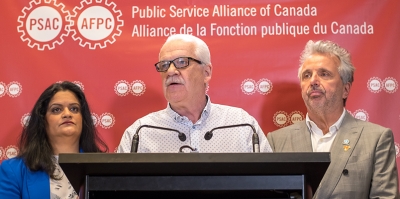155,000 Striking Workers to Disrupt Canadian Immigration Services
Immigration, Refugees and Citizenship Canada (IRCC) faces a significant disruption to its immigration services as 155,000 striking workers take to the streets.
The Public Service Alliance of Canada (PSAC), an industrial union that represents 155,000 federal government employees, has announced a strike that will take effect today, affecting most government ministries, including IRCC. While the strike is in effect, some government services will be restricted.
Areas of disruption
Most importantly, according to IRCC, certain interruptions and delays are to be expected in the following:
⇒Join us on Telegram for more Sure and Accurate football-winning tips every day...click here
- Application processing.
- In-person appointments or events such as citizenship ceremonies.
- Contacting IRCC by email, phone, or social media.
- Consular services for citizenship and passports.
- Canadian passport services.
Available IRCC services
According to IRCC, some services will continue to be provided to applicants. You will still be able to do the following:
- Online applications
- Mail applications to IRCC
- Use of your online accounts
- Access some emergency services
These services continue to be provided by non-governmental organizations:
- IRCC partner groups provide settlement assistance.
- Interim Federal Health Program (IFHP) healthcare.
- Outside of Canada, visa application centers.
Furthermore, Employment and Social Development Canada (ESDC) anticipates interruptions to the Temporary Foreign Worker Program (TFWP) and biometric data collecting.
What is the strike about?
The union, which represents 155,000 Canadian public servants, says it is striking for higher pay, a better work-life balance, greater workplace inclusion, and fewer layoffs by creating more jobs rather than contracting roles to private firms.
On April 17, the government said that both parties were in talks to negotiate an agreement and prevent the strike. At the time, the government proposed a 9% pay raise over three years, mirroring the recommendations of the third-party Public Interest Commission.
One of the most pressing concerns is ensuring that PSAC members may continue to work remotely. According to the union, during the COVID-19 pandemic, public employees were just as successful working remotely as in the office, and 90% of employees want to continue working remotely.
The government claims that the requests, as currently constituted, will significantly impact its ability to provide services to Canadians and hinder its ability to manage people inside the public sector efficiently.
According to the government, benefit payments will be prioritized, and the Canada Child Benefit will continue during the labor interruption. Payments will also be made as planned for the following:
- Employment Insurance payments
- Canada Pension Plan payments
- Income assistance for veterans
- payments for old Age Security and the Guaranteed Income Supplement payments
Overall, the disruption of Canadian immigration services due to 155,000 striking workers could have serious consequences. Therefore, it is also essential that the federal government and union representatives work together to come to an agreement that will benefit all parties involved




